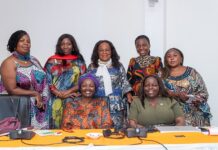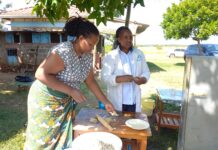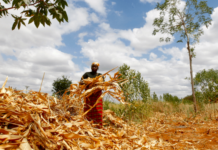By Jackson Okata
Baringo County, Kenya: The vast green canopy formed by thousands of the prolific and invasive Prosopis Juliflora, locally known as Mathenge trees welcome your sight into the Salabani village of Baringo County, home to the indigenous Njemps/Ilchamus community who since time immemorial, have heavily banked and relied on pastoralism as their main economic activity in an environment characterized by semi-arid climatic conditions.
From a distance, under the scorching sun and occasional waves of brown dust particles flying in the air, a cluster of women sits together beneath the sprawling canopy of a majestic tree whose lush foliage casts a dappled pattern of shade upon the ground, providing a welcome relief from the relentless arid heat. Amidst the harsh climate and the challenges of semi-arid life, the Ilchamus women are championing a transformation towards food security, empowerment, equality, and resilience against all odds.
Uniquely Breaking Societal Norms
In the shadow of pervasive gender-based violence, forced early marriages, teenage pregnancies, the long-standing specter of female genital mutilation, and perennial food insecurity, the women of Salabani village have risen, not as victims, but as architects of change. They have embraced agroecological farming practices, to cultivate not just crops, but hope. Bit by bit, with determination they are slowly turning barren lands into fertile fields, transforming the landscape of their lives and their communities.
For decades, Rebecca Lekae, was a housewife who only took instructions from her husband, whether wrong or right. “Our work as women was to take animals into the grazing fields and cook for the family. We were never involved in decision making because men were the final say’’ Lekae narrates.

“A woman going to work was unheard of in our community. We had to wait for the man to bring food and if he came back with nothing, then it meant the family would go hungry’’ she added.
In Salabani, just like many arid and semi-arid parts of Baringo County, food was scarce because the farms could only produce too little when climatic conditions permitted. Initially, farmers would rely on the government for seeds and they only practiced monocropping of maize. The majority were forced to sell their animals to cover farming costs and even worse, they sold whatever little they harvested only to be left relying on relief food from well-wishers and the government.
“We only used to plant maize because we had no knowledge about mixed cropping. We believed that maize was the only crop we could grow because men made the decisions on what should be planted on the farm,’’ said Lekae.
Baringo County is a medium altitude zone with average rainfall varying from 1,000 -1,500 mm in the highlands to 600mm per annum in the lowlands. The temperatures range from a minimum of 10°C to a maximum of 35°C in various parts of the county.
Power of Knowledge
Four years ago, Seed Savers Network set foot in Salabani to train the community and more so women about agroecological farming practices as a way of enhancing food security, empowering women, and reducing over-reliance on relief food.
Lydia Nyambura, a field extension officer at Seed Savers Network says that agroecology is helping save Salabani village from exploitation by seed companies who make farming an expensive venture. “These companies sell seeds to farmers at unreasonable prices but after harvesting they buy from the same farmers at exploitative prices. Chemical-based fertilisers needed in conventional farming are more expensive than the seeds making farming expensive for poor families’’.
According to Nyambura, agroecological farming practices are not only helping Salabani farmers enhance their food security but also empowering women and helping them secure their rights including land rights.
“Through agroecology, these women can now have a say on what is planted on the farm. They decide when to harvest their produce and how to sell them. It is helping secure land rights for women’’ she said.
With mixed cropping, Lydia notes that the women are now able to earn their own little money, something she says, “has given them a place at the family decision-making table”.
“When a woman harvests and sells her vegetables, she makes little money which helps in sorting out family bills. This has killed the habit of them fully relying on their husbands to provide. With their small money and with food security, these women can now have a voice in the family’’ added Nyambura.
According to Seed Savers Network, by empowering Baringo women through agroecological farming practices, the community is slowly realising Goal 5 of the Sustainable Development Goals of the United Nations which is to “achieve gender equality” and reduce harmful practices.
Women Voices
For women like Lilian Kakimo, agroecology has helped them regain their land rights as an indigenous woman. “For me, agroecology is not just about producing food but also about leadership and empowerment. Through agroecology I have regained my right to farm use, harvest, and sales’ she said.
“Initially, the man would decide what is to be planted, the women would provide labour throughout the preparation of land, planting, caring and harvesting but when it came to selling of the harvest, it was the man who had the final say but with my input through agroecology, things have now changed’’ she added.
Kakimo explains that agroecological farming is not expensive since all inputs used are found on the farm, unlike conventional farming. “With kitchen gardens, one can have a steady supply of vegetables, and this enhances our family’s nutrition”
“Because now I have a right over land use, I have all the freedom to plant numerous crops through organic methods and we no longer have to wait for men to return in the evening with food. When a man comes back home and finds everything set, he will less likely bring conflicts’’ she added.

Being an area where rainfall is scarce, the women of Salabani are finding agroecology farming practices a perfect fit since it does not require much rainfall. Jane Maramba, says that with training from seed savers, they now have the power to guarantee their families balanced diets.
“One trigger of gender-based violence is relying on the man for everything. With the little money we make from agroecology farming, our husbands have learned to respect and embrace us. This has brought love within our families and conflicts are no longer a common thing’’ Maramba observed.
Statistics from the National Crime Research Centre indicate that Baringo County records a 64.7 percent rate of gender-based violence cases(including domestic violence) against a national percentage of 45.4 percent of reported GBV cases.
For Dinah Sikamoi, by contributing to the financial well-being of their families, women are now able to influence decisions touching on their young girls something she says has helped tame cases of female genital mutilation and forced teenage marriages, vices that were common among the Ilchamus.
“With this empowerment, we can now face our men and tell them that FGM is bad and outdated. We can step in and stop our girls from being married off to old men in exchange for animals” said Sikamoi.
While the Kenya Demographic and Health Survey (KDHS) report of 2022 indicated a steady decline in the FGM prevalence, Baringo County has a 62 percent FGM prevalence rate with 21.2 percent of women in the vast county having undergone the retrogressive cultural practice in comparison with the national ratings of 15 percent.
Sikamoi adds that with the little money they make, they can now support their husbands in ensuring that children are in school and by helping them pay school fees. This, she says has helped deal with the problem of school dropouts which contributed to teenage pregnancies and early marriages.
“When our girls are in school, chances of them being exposed to FGM, teenage marriages, and pregnancies are reduced’ Sikami says.
And as Maramba adds, their endeavor is not merely about putting food on the table, but also reclaiming their dignity as women.
Beating the Climate Change Challenge
Through groups, the seed savers network has been training the Salabani women on different climate-smart farming techniques like kitchen gardening that require much less water. They have also been receiving training on seed saving, pest management, and post-harvest management.
Kakimo explains that they have been taught several techniques of traditionally conserving and saving seeds including identifying seeds that are viable for germination.
Because of prolonged drought seasons in the region, farmers would consume seeds that they had stored for the next planting season, but Kakimo says traditional seed saving has provided them with a solution.
“We have learned the art of seed sharing which ensures that no farmer lacks seeds for planting. After the training, we are now able to make our own manure and pesticides on the farm using locally available material at no cost’’ she said.
Farmer-managed seed systems contribute to more than 70% of the seeds in Baringo County.
African leafy vegetables, millet, sorghums, groundnuts, pigeon peas, as well as root crops such as cassava, and sweet potatoes, are predominant indigenous crops that can do well in Baringo County through organic farming.
Economic and social power
Apart from growing crops, the women also engage in the rearing of indigenous chickens as well as setting up tree nurseries. They sell eggs, chicken, and tree seedlings to make extra income. Courtesy of the money they make from selling their farm produce, the women engage in table banking under the Meoro women group where they advance soft loans to members.
Sikamoi notes that the group has 30 women who contribute Sh 200 each and they have been able to invest in the purchase of tents and plastic chairs which they hire out during private and public functions, something she says has boosted their finances and earned them respect from their husbands.
“The knowledge of agroecology was the start of our empowerment and economic transformation. Nowadays, our husbands freely give us permission and time to attend women’s group meetings, something that was unheard of before’’ said Sikamoi.
The Salabani women have also been able to invest in plastic water tanks which they use to store water for domestic use, saving them the energy and time spent in walking long distances to fetch water.
For Salabani women, by embracing agroecology, they are sowing seeds of empowerment, resilience, and dignity, transforming not just their land but the very fabric of their community, heralding a future where hope flourishes against the odds of women’s rights, gender-based violence, and food insecurity.














